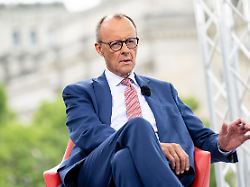CDU leader in the “summer interview”
Merz leaves all options open in the K question
08/27/2023, 4:21 p.m
The Union is not only discussing who the next candidate for chancellor could be, but also when this will be determined. CDU boss Merz has not yet committed himself to this debate. On the other hand, unlike a few weeks ago, his attitude towards possible cooperation with the AfD is clear.
CDU leader Friedrich Merz has left open when the Union should determine its candidate for chancellor: before or after the state elections in late summer 2024. After the Hessian Prime Minister Boris Rhein had followed the suggestion of CSU leader Markus Söder, the candidate for chancellor only after the state elections in three East German federal states in September 2024, Merz said in the ARD “summer interview” in Berlin: “That can be a good argument. I know that some of the East German state associations see it differently. We decide that together and not public.” In September 2024, a new state parliament is to be elected in Saxony, Thuringia and Brandenburg.
Merz emphasized the joint responsibility with Söder in the search for a Union chancellor candidate for the 2025 federal election. “Markus Söder and I have a shared responsibility for the CDU and CSU,” said Merz, who is also chairman of the Union faction in the Bundestag. There is a common parliamentary group, together we go to the next elections, the European and the federal elections. “We will also take on this joint responsibility, also with regard to the timing. It is now summer 2023. We are talking about late summer 2024 and the 2025 federal election.”
Merz had said in the past that he wanted a decision after the European elections in summer 2024. However, Söder advocates a later date. In the CDU, it is suspected that the Bavarian Prime Minister wants to improve his own chances of a chancellor candidacy in view of the expected poor results of the CDU in Saxony, Thuringia and Brandenburg. Officially, Söder, who has to face state elections in Bavaria on October 8 this year, has rejected his own candidacy for chancellor. However, this was also the case in 2021 when he reversed his decision.
“Don’t look at polls”
A number of CDU Prime Ministers had made it clear in the past few weeks that they would be involved in a decision and that they did not want to leave it to party leaders Merz and Söder. In addition to Merz and Söder in the CDU, other possible candidates are NRW Prime Minister Hendrik Wüst and Schleswig-Holstein state leader Daniel Günther.
Confronted with poor results in polls on the chancellor question, Merz emphasized that he is currently ahead of Chancellor Olaf Scholz and the Green Ministers Annalena Baerbock and Robert Habeck on this issue. “But we’re not looking at surveys now. We’re making sure that we’re on the right topics.” It is important that the Union gets the majority in the next federal elections. Merz added: “If there were federal elections today, there could be no government in Germany without the Union.”
When asked about his controversial statements from an interview in July, Merz again ruled out any cooperation between his party and the AfD at all political levels. “We have a clear decision-making position in the CDU. We don’t work with the AfD. Not in the parliaments, not in the local councils,” said Merz. When asked whether this also applies to the municipal level, he added: “A no is a no. (…) Also at the municipal level.”
Merz rejects AfD ban
The statements made by Merz at the time on how to deal with the AfD in municipalities were often interpreted as softening the demarcation between the CDU and the right-wing populists. Merz had vehemently contradicted that at the time. In the ZDF interview, Merz explained that if the AfD elected a district administrator in Thuringia and a mayor in Saxony-Anhalt, then these were democratic elections. “We have to accept that. And of course the local parliaments have to look for ways to shape the city or the district together.”
Merz now emphasized that this comment did not refer to the CDU alone. This is “a challenge for all parties. That includes the SPD, the Greens, the FDP, if there are free voters, they too. We have to look for ways and we will find these ways too.” There are “majorities in all parliaments in Germany, in all, including all local councils, without the AfD”. The Union faction leader added: “A right thing does not become wrong because it is said by the wrong people. We make our policy according to our convictions and that says everything.”
At the same time, Merz was opposed to an AfD ban. “Party bans have seldom had any effect in the Federal Republic of Germany. The people who are on the wrong political path are still there. I think very little of that.” The AfD is classified and observed by the Office for the Protection of the Constitution as a suspected right-wing extremist.
